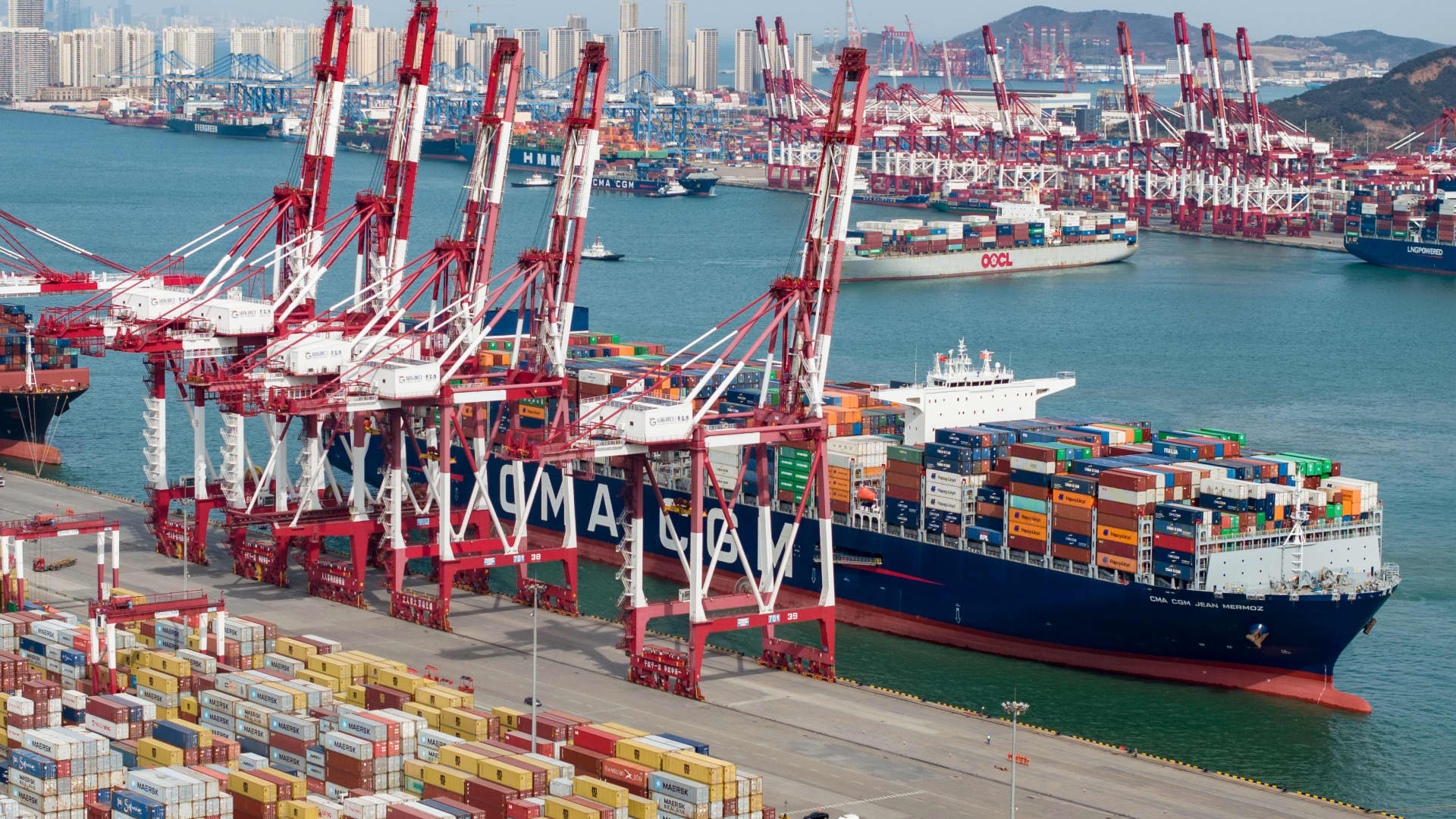Container ships from international trunk lines, including those from Europe, Africa, India, Pakistan, and Southeast Asia, are loading and unloading containers at the container terminal of the Qianwan Port Area of Qingdao Port in Qingdao, China, on April 4, 2024.
Nurphoto | Getty Images
The World Trade Organization on Wednesday said that it expects global trade to rebound gradually this year, before rising further in 2025, as the impacts of higher inflation fall into the rearview mirror.
In its latest “Global Trade Outlook and Statistics” report, the WTO forecast that total global trade volumes will increase by 2.6% in 2024, and by a further 3.3% in 2025. It follows a larger-than-expected 1.2% decline in 2023, as inflationary pressures and higher interest rates weighed on international trade.
“The reason for this pickup is basically the normalization of inflation and also the normalization of monetary policy, which has been a drag on trade in 2023,” the WTO’s chief economist Ralph Ossa told CNBC’s Silvia Amaro.
The trade rebound is expected to be “broad-based,” including across Europe, which experienced some of the deepest falls in trade volumes last year as a result of geopolitical tensions and the energy crisis caused by Russia’s full-scale invasion of Ukraine.
“Europe was really weighing on international trade in 2023, and we don’t see that being the case anymore,” Ossa said.
Geopolitical risks remain
Overall, world trade has been “remarkably resilient” over recent years, rising above its pre-Covid-19 pandemic peak in late 2023, the WTO report concluded. However, the organization warned that geopolitical tensions could still pose a risk to its outlook.
In particular, the ongoing war between Israel and Palestinian militant group Hamas could cause major trade disruptions, should it spill over into energy markets, Ossa said.
The economist also pointed to signs of global trade “fragmentation” along geopolitical lines.
The WTO report divided the global economy into two “hypothetical geopolitical blocks” based on U.N. voting patterns and found that trade growth between the blocks was slower than within them. The U.S. and U.K. for instance, have typically taken similar positions in recent U.N. votes on the Russia-Ukraine conflict, while China and South Africa, on the other hand, have taken opposite views.
That fragmentation was especially notable between the world’s two largest economies, the U.S. and China.
“We’ve seen that trade growth between the United States and China was 30% slower than trade growth between these countries and other countries,” Ossa said, referring to the period since 2018, when trade tensions initially arose.
“That doesn’t mean that they are not still trading a lot, but their trade shares are increasingly moving away from these relationships.”
Trade tensions between the U.S. and China resurfaced this week, when U.S. Treasury Secretary Janet Yellen said she would not rule out possible tariffs on Beijing, if it is found to be engaging in unfair trade practices. The calls for a tougher stance on China were echoed on Tuesday by European Commission chief Ursula von der Leyen.
The spat centers on claims that China is “dumping” subsidized green technology goods into international markets, effectively undercutting domestic producers. Beijing denies the claims.
The WTO report does not detail China-specific trade forecasts, however it expects a 3.4% aggregate increase in Asia exports in both 2024 and 2025.
“That doesn’t mean that, in particular sectors, we couldn’t see or we don’t expect to see any surges,” Ossa said.

 Finance1 week ago
Finance1 week ago
 Blog Post1 week ago
Blog Post1 week ago
 Personal Finance1 week ago
Personal Finance1 week ago
 Personal Finance1 week ago
Personal Finance1 week ago
 Economics1 week ago
Economics1 week ago
 Economics5 days ago
Economics5 days ago
 Economics1 week ago
Economics1 week ago
 Accounting4 days ago
Accounting4 days ago






















